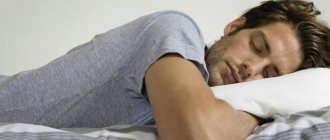Why does a person moan in his sleep? According to medical terminology, this phenomenon is called catophrenia. This word is of ancient Greek origin, and it consists of two meanings. Cata, translated from Greek, means “below”, and phrenia means “lamenting”. That is, according to the ancient definition, people who moan during sleep have long been called “lower lamenters.” Why does a person moan when he sleeps, and what to do? We will try to figure this out.
Undesirable symptoms associated with moaning during sleep
Doctors recognize this problem; they tend to consider a person’s groaning in sleep to be an undesirable phenomenon. This condition is classified as parasomnia. Therefore, it is advisable to get rid of it if possible, but it in itself does not pose a risk to human life.
Frequent moaning during sleep has an extremely negative impact on both the psychological and physical health of a particular person, as well as those around her. For example, close people may be annoyed by the frequent groans of a sleeping person. At the same time, they may suffer from insomnia, have a constant feeling of irritation and fatigue.
Dependence of quality of life on rest from catophrenia
Any manifestation of parasomnia causes serious disturbances in the body. Moaning during sleep negatively affects not only the patient’s condition, but also the well-being of people close to him:
- A loud sound causes nervous tension and sleep disturbances in everyone who hears it;
- At a late stage of development of the disease, moaning wakes up the patient himself, causing lack of sleep;
- From a psychological point of view, lack of control over the body instills in a person a lack of confidence in his own abilities.
Catathrenia harms both the moaning person and his family. Increased sleepiness and irritability in all family members often leads to disagreements and problems that would not arise under normal conditions. The disease requires treatment, if only to restore a calm atmosphere to the home.
What exactly causes a groan and what are its features?
Why does a person moan in his sleep? During sleep, a person, letting the air into himself very deeply, tends to hold his breath for a certain time. Then exhalation occurs, which is often accompanied by a very unpleasant groan.
The frequency of such a groan from a sleeping person can be either an instant or a minute. According to the general tendency, catophrenia lasts longer during the second part of the night period. This fact is due to the fact that the paradoxical phase of dreams becomes longer closer to the morning.
If someone prone to cataphernia changes the position of their own body while resting, the groaning may stop for a certain period, but not for long.
Men suffer more from moaning in their sleep: in them this phenomenon occurs 3 times more often than in women. It mainly begins to develop at the age of 18-20 years.
Causes
The problem has not yet been fully studied, but safe and dangerous causes that provoke moaning during sleep have been identified. And they can also be classified as physiological, pathological and individual. Safe and not requiring medical intervention include:
Sleep apnea syndrome
- fatigue, stress, exhaustion of the body;
- an influx of emotions during pleasant/nightmare dreams;
- insomnia of various types;
- drinking large amounts of alcohol before bed;
- overweight.
Reasons indicating health problems are:
- respiratory tract diseases;
- neuroses, neurological and mental pathologies;
- VSD, which provokes surges in blood pressure and hormonal imbalance;
- increased intraocular or intracranial pressure, leading to pain and groans;
- central nervous system disease or brain damage;
- hypertension.
IMPORTANT! Often people wake up in the morning with a sore and torn throat, not realizing what is happening at night.
Causes of children's moans
If a child moans in his sleep, there may also be several reasons for this. The most common of them are highlighted depending on the age of the baby.
| Age group | Reason for moaning |
| 1–2 months | Prematurity, colic, a month-old baby groans due to adaptation to the outside world after a long 9 months in the womb. |
| 6 months | Imperfect nervous system, development of digestive function, stool disorders, intestinal infection. |
| 12 months | Colds, an infant feels discomfort during sleep (tight clothes, full diapers, etc.), psychological reasons (the emergence of fears, getting to know the world, receiving new information, acquiring new skills). |
| 4 years | Increased sensitivity of the child's psyche, prodromal period. |
As they grow older, babies make less and less strange sounds in their sleep. In the period of 7-8 years they are almost not observed. If the syndrome does not go away on its own, and the moaning constantly bothers you, you should consult a pediatrician. The need for medical intervention is also indicated by the following signs that accompany night moans:
- elevated temperature;
- nausea and vomiting;
- pain;
- convulsions;
- cough and runny nose;
- change in skin color;
- rashes, swelling;
- the child often wakes up and cries;
- enlarged lymph nodes.
Teenage moans during sleep are often provoked by a rich psycho-emotional background. During this period, a teenager is more susceptible and reacts to things differently. If this is the reason, then over time catophrenia will disappear on its own.
What are the types of groans, their symptoms and characteristics?
Moans can be produced in completely different ways, and the person who involuntarily reproduces them may not even be aware of such a problem. Symptoms indicating its presence include:
- dry throat;
- pain in the nasopharyngeal system;
- complaints from surrounding people.
If these factors converge, you should take this problem into account and take measures to eliminate it
Among the main types of sounds from catafernia, unpleasant and rather loud moans stand out, which look like a howl, squealing or mooing.
Preventive measures
Since permanent moaning often occurs due to exposure to external irritants, eliminating them will help get rid of the disorder or prevent its occurrence. To do this, you need to study the recommendations of specialists.
- Ventilate the room regularly.
- Create a comfortable temperature and humidity regime in the bedroom.
- Adjust your diet and schedule your last meal no later than 2-3 hours before bedtime.
- Avoid taking alcohol, coffee, strong tea, and stimulants 5-6 hours before rest.
- Ensure complete darkness and silence by turning off all appliances.
- Develop the habit of falling asleep no later than 22-23 hours, when melatonin synthesis reaches its maximum concentration.
- Try not to surf the Internet and not to stay on social networks or in front of the TV at night.
As practice shows, these measures are often enough to improve sleep and get rid of night groans.
The main features that distinguish cataphernia from other phenomena
Cataphernia differs from many phenomena that can occur to a person during his sleep. For example, it differs from snoring in that sounds are produced directly when air is exhaled. During snoring, everything happens exactly the opposite.
Sleep apnea differs from catafernia in that breathing in this process stops after exhalation.
Differences
Catathrenia can be confused with other dream disorders:
- Snoring and catophrenia are different from a physiological point of view. The first phenomenon occurs on exhalation, the second on inhalation.
- Apnea occurs during exhalation. Breath holding during catophrenia is after inhalation, during apnea - after exhalation.
- Stridor is a sleep disorder. It manifests itself as difficulty breathing as a result of stenosis of the upper organs of the respiratory system.
- Mooing occurs during epileptic seizures.
- Dream-speaking is not associated with the breathing process.
When identifying pathology, doctors carry out differential diagnosis to exclude other disorders.
Causes of moaning during sleep
In order to fight such a disease, it is worth trying to identify the true reasons that provoke its formation. Why does a person moan in his sleep at night? In order to find out, you can contact your doctor, who will not have any difficulty in making the correct diagnosis and giving recommendations regarding treatment for cataphernia.
There are a number of assumptions why a person groans during sleep. Doctors have identified the following main reasons:
- A problem with the upper respiratory tract, blockage or narrowing.
- A damaged structure in the brain that controls breathing.
- Closing of the vocal cords during the paradoxical stage of sleep, which can provoke overcoming resistance.
- Hereditary origin. Most of those who suffer from cataphernia have family members who also suffer from sleep disorders. This could be sleepwalking, bruxism, nightmares.
- Removal of teeth due to crowding, various orthodontic problems.
- A jaw that is undeveloped according to medical standards.
- High susceptibility to nervous tension, anxiety and stress.
- Mental and physical exhaustion.
Alcohol lovers should also refrain from drinking too much, especially before bed. If a person drank any strong alcoholic drink immediately before a night's rest, he will also be susceptible to cataphernia.
Therefore, the norm in this situation is to drink alcohol no later than 4 hours before the onset of deep sleep.
Smokers should also be careful about their own health. Indeed, by constantly inhaling tobacco smoke, a person exposes himself to the risk of mucus congestion in his respiratory tract. As a result, the body has to make some effort to push the air inside. And this all leads to noise moaning.
Sometimes even sleeping on the back causes the back of a person's tongue to sink, which leads to blockage of a significant part of the opening through which air passes. This is why the production of unpleasant sounds in the form of groans occurs during sleep.
Why does a person moan in his sleep?
Possible causes of catophrenia:
- psycho-emotional reaction to pleasant (unpleasant) dreams;
- pain syndrome that does not interfere with the patient’s rest;
- anomalies in the structure, diseases of the upper respiratory tract that impair exhalation;
- excess weight is the cause of oxygen starvation, shortness of breath, which results in a violation of the breathing process;
- pathologies of a neurological, mental nature that cause acute disorders: groans, sudden rises, other disturbances that are often not remembered after waking up;
- abuse of alcohol-containing products, drug use, long-term uncontrolled use of medications lead to disruption of the central nervous system, disruption of the quality of rest;
- vegetative-vascular dystonia causes hormonal imbalance, sudden changes in blood pressure that occur at any time, including at night;
- high intracranial and intraocular pressure, leading to the development of pain in the head, groaning and other sleep disorders.
Diagnosis by a doctor
If there are problems with sleep, a person groans or whines in his sleep, it is necessary to urgently contact a specialist. Doctors, in order to professionally establish the cause of the described disease, carefully conduct research and interview their patients. Among the main questions that medical professionals often ask all those who decide to use their service may be the following:
- what is the frequency of moans and their duration;
- how often do nightmares occur?
- is there pathology in the family environment;
- How often do you drink alcohol or take drugs before bed?
It is also very important to show the specialist a diary in which notes were kept regarding the characteristics of nighttime moaning. It can be carried on thanks to relatives. After all, they are able to clearly describe the behavior of a person suffering from this disease during rest.
Fighting catophrenia
Since catophrenia is not considered a disease, but only a specific sleep disorder, there are currently no treatment methods. The doctor can only give some recommendations to the patient that can minimize or eliminate cataphrenic symptoms, as well as give some advice to loved ones who suffer the most from the groans of the person sleeping next to them.
Advice! In certain cases, homeopathy comes to the rescue, but the effectiveness of the drugs has not been fully studied.
Help from specialists
It makes sense to consult a doctor if nighttime moaning is accompanied by some symptoms indicating the likelihood of another pathology:
- daytime sleepiness;
- absent-mindedness, memory impairment;
- increased irritability;
- tense nervous state;
- decreased concentration and reaction acuity;
- periodic headaches;
- sleep disorders of other etiologies - insomnia, nightmares.
In this case, qualified assistance can be provided by specialized specialists.
An otorhinolaryngologist who will determine the presence of pathology through a detailed examination of the ENT organs and respiratory tract and help get an answer to what causes nighttime moaning.
A somnologist whose competence includes studying sleep patterns based on polysomnography in order to determine the connection between night moans and other sleep disorders.
A psychotherapist who can determine or exclude the psychological aspects of the development of catophrenia.
Home methods
Daily implementation of the doctor’s advice will help to effectively combat the disorder, alleviate the condition and reduce groaning during the night’s rest.
For patients:
- Take a hot bath or shower before bed. This procedure will help clear the nasal passages and airways, which will facilitate air circulation during the night. This measure is especially relevant if a person has a cold and cough.
- Conduct a breathing exercises session.
- Drink a cup of warm herbal tea or with the addition of mint, lemon balm or honey with lemon.
- Properly arrange the sleeping area by raising the head of the bed. This will help prevent the retraction of the uvula and soft palate - a common cause of night moans.
To others:
- Use earplugs during attacks on the person sleeping next to you.
- Turn on the fan and humidifier. The devices will help restore a comfortable indoor microclimate and provide background noise.
- If possible, change where you sleep by going to another room.
- In case of strong or frequently repeated moaning, carefully, so as not to wake the sleeping person, change his position by turning him to one side. As a rule, this helps him calm down for a while.
Which specialists are best to contact?
What to do if you moan in your sleep? Which doctor should I contact? You need to visit a somnologist. He can study the characteristics of sleep in detail, as a result of which he can determine whether nighttime moaning has connections with other disorders in this area.
The otorhinolaryngologist conducts a detailed examination of the ENT organs in order to identify the organic cause that led to the formation of cataphernia.
A psychotherapist will be able, if necessary, to eliminate any mental problems.
Diagnostics
The first stage is an oral survey, during which the therapist (or a specialized doctor) clarifies the frequency, duration, and intensity of moans; how disturbed the sleep is, the presence of a hereditary factor, as well as existing bad habits.
In order to track the picture of the ongoing process, a woman or man is asked to record daily changes in condition:
- events experienced during the day (to determine tension and psycho-emotional background);
- daily routine: time of waking up and falling asleep, getting up at night;
- well-being after sleep;
- attacks and the nature of the moaning (the wife or husband who is nearby during the night moaning will help with this point).
In advanced cases, polysomnography is prescribed. Polysomnography is a procedure that involves connecting sensors to a sleeping person. Based on the data obtained, the somnologist makes a conclusion about the root causes that served as a signal for the manifestation of catophrenia.
Polysomnography procedure. Using computer systems, heartbeat, pulse rate, breathing, and the functioning of internal organs are recorded
What research is carried out for cataphernia?
If this problem exists, there is often no need to conduct instrumental research to establish the true causes of its occurrence. However, if cataphernia is in an advanced form, the doctor can perform polysomnography. Thanks to it, the work of the heart, brain waves, and breathing rate during sleep are studied. In addition, the movements of the arms and legs during rest are analyzed and recorded. All this makes it possible to determine whether catafernia is associated with other diseases.
Subjective factors of catophrenia
This includes individual reasons for the occurrence of nighttime moaning.
- Poor sleep hygiene. Failure to ensure proper night rest can complicate this process and cause catophrenia. A person should not be hot, cold or stuffy when he sleeps.
- Eating too much before bed often leads to restless sleep. The gastrointestinal tract continues to work, the body does not fully rest. This condition is often accompanied by groans.
- Drinking alcohol, coffee, or energy drinks shortly before going to bed also leads to parasomnia with nighttime moaning.
- Smoking. People who smoke often experience a condition that is similar to the manifestation of VSD. Vascular spasms lead to a feeling of discomfort. The load on the heart causes painful sensations, the person groans in response to this.
- Taking various medications. As a rule, catophrenia is caused by the use of various drugs that stimulate the nervous system. These can be antidepressants, tonics. Somnologists have repeatedly noted that treating insomnia with sleeping pills can also cause catophrenia.
- Sleeping pose. Sometimes individual anatomical features of the structure of the nasopharynx lead to the closure of the vocal cords while sleeping on the back. The tissues of the palate can also sag, but this phenomenon leads to snoring or apnea. If you lie on your side while sleeping, the manifestations of parasomnia will not be so pronounced.
Treatment for moaning during sleep
Why does a person moan in his sleep? You already know the possible reasons. How to treat? An exact method of treating cataphernia has not been developed, but certain recommendations can be given to eliminate or minimize it:
- Before going to bed, you should take a shower or bath, rinse your nose with warm water;
- carry out breathing exercises based on generally accepted rules;
- drink hot tea;
- take a pose while resting with the head of the chair raised.
For all those who are nearby, you should also be advised to use earplugs while sleeping, sleep in other rooms, and carefully change the body position of the person who makes loud noises while resting. Of course, the problem itself associated with the presence of catafernia is not dangerous and does not pose a great threat to human life and health. But you still need to find out why a person groans in his sleep, since this ailment can be closely related to serious diseases. There is no need to panic in this situation; today there are many ways by which such ailments can be eliminated once and for all.
Treatment
If a person sleeps restlessly, often wakes up and is haunted by problems that prevent him or his loved ones from resting peacefully, then, first of all, they are fighting not the symptom, but the cause. Depending on its etiology, appropriate medications are prescribed.
IMPORTANT! Catathrenia does not harm the patient and is not a disease, but it can lead to rapid fatigue and prevent others from resting peacefully. Therefore, the doctor will prescribe measures to minimize symptoms and eliminate the root cause.
To treat respiratory diseases, medications and physiotherapeutic procedures are prescribed. Surgery may be necessary if the nasal septum is abnormally structured or to expand the lumen of the upper respiratory tract.
A popular means of improving breathing is CPAP therapy, which involves the use of an oxygen mask to ventilate the lungs. If the cause of night moans is stress, overexertion, negative emotions, sessions with a psychotherapist or psychologist will help.
Help at home
Regularly performing simple daily measures will help relieve symptoms and promote deeper, more restful sleep. To do this you need:
- Before going to bed, take a hot shower or bath, which will clear your airways and nasal passages. This will make it easier for air to circulate while you sleep.
- Practice doing breathing exercises.
- Replace your evening snack with warm tea with lemon balm or honey.
- Raising the head of the bed will prevent the uvula and soft palate from sinking, which quite often provokes nighttime moaning.
- Balance your diet and give up bad habits.
- Walk in the fresh air more often (including active games, cycling, jogging, which develop and train the respiratory system).
- Take a sedative based on herbal extracts prescribed by your doctor.
CPAP therapy can be performed at home by purchasing a compact device. The method perfectly fights not only catophrenia, but also snoring
Those around you should also take note of several useful techniques that will help you “isolate” from a disturbing moan: use earplugs, turn on white noise, and, if possible, try to change the sleeping position after the groans appear. If the proposed methods do not help eliminate the characteristic sounds, it is recommended to sleep in another room, since good quality sleep is necessary for every person.
So, catophrenia is a rather tricky sleep disorder that interferes with the rest of others and practically does not affect the sleeper. Before you begin to fight night moans, you need to determine the cause. Therapy must be coordinated with a doctor. Having this feature, it is worth reconsidering your lifestyle today and taking your own health more responsibly and seriously.
Prevention
Often catophrenia is completely harmless for the sleeper himself, but at the same time it causes serious discomfort for the people around him. Sometimes a person moaning at night does not even notice this phenomenon and is not aware of its existence. The sleeper can moan either constantly, every night, or periodically. The permanent appearance of night moaning indicates the body’s reaction to irritants. To eliminate the influence of subjective factors of catophrenia, follow a few simple rules:
- Ventilate the room before going to bed.
- Avoid taking alcohol or nerve stimulants 4-5 hours before going to bed at night.
- The optimal temperature for the bedroom is considered to be 21-22 degrees Celsius with a relative humidity of 65-70%.
- Don't overeat before bed. The last meal is 2 hours before going to bed and contains light, low-fat foods.
- Turn off electrical appliances in the bedroom.
- Provide darkness. If the eyes see light even through the eyelids, the body stops the production of melatonin, the hormone responsible for normal sleep.
- Melatonin reaches its highest concentration in the blood at 22-23 hours. Try to go to bed before this time.
- Avoid irritating your nerves before bed by watching intense movies, video games, etc.
If you organize a night's rest according to these recommendations, and the moaning still appears, make an appointment with a somnologist. This is a doctor who studies and eliminates sleep problems. It may be necessary to take an encephalogram of the brain. It would also be appropriate to visit a therapist to rule out other diseases that provoke catophrenia.










